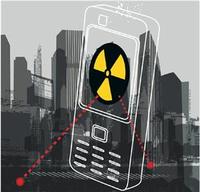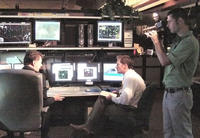-
Monitoring nukes with social media

Acting Undersecretary of State for Arms Control Rose Gottemoeller is actively trying to find a way to incorporate social media tools to prevent nuclear weapons proliferation and keep fissile materials out of the hands of terrorists; the department wants to have crowdsourcing tools developed that could help ordinary citizens monitor a government’s nuclear activity and whether it was adhering to its stated promises
-
-
Inquiring minds want to know
“It is not surprising to see more FOIA [Freedom of Information Act] requests sent in to an administration that has emphasized transparency… We’re making a strong effort to keep up with that demand by devoting more resources to it.”
White House spokesman Eric Schultz on why the Obama administration could not keep pace with the increasing number of people asking for documents, e-mails, photographs, and more under FOIA -
-
NYC cyberattack simulation to spur Senate cybersecurity legislation

Last Wednesday, in an attempt to bolster support for cybersecurity legislation, the White House staged a mock cyberattack on New York City’s power supply for the Senate
-
-
Missouri first responders learn from last year’s tornado season
Drawing on the valuable lessons learned from last year’s record tornado season, emergency officials in the St. Louis area were ready to spring into action immediately after tornadoes swept through the state once again last week
-
-
U.K. worried about dirty bombs

U.K. deputy prime minister Nick Clegg warned that materials to make a dirty bomb are readily available – so much so, that police forces cannot hope to contain such a threat; “That is a stateless threat, impossible for any national police force, no matter how advanced, to contain,” he said
-
-
No racial profiling, abuse by Secure Communities
The Earl Warren Institute at the University of California, Berkeley Law School claimed that DHS Secure Communities program suffers from a disturbing pattern of abuse of authority by ICE, including wrongful arrests of thousands of U.S. citizens, a pattern of racial profiling against Latinos, and denial of due process for aliens in removal proceedings; a new study by the Center for Immigration Studies says this is not the case
-
-
Public health expert: budget cuts will erode response capabilities
Homeland Security NewsWire’s executive editor Eugene K. Chow recently got the opportunity to speak with Dr. John R. Finnegan, the dean of the University of Minnesota School of Public Health; in their interview, Dr. Finnegan discusses the devastating effects of proposed budget cuts on the U.S. public health system, why it was a wise decision to censor the release of H5N1 flu research; and the creation of a medical reserve corps at universities
-
-
National Weather Service budget cuts threaten poor IT infrastructure

The Obama administration has proposed cutting more than $39 million from the National Weather Service’s (NWS) budget, particularly from its IT department, and critics worry that the cuts could cause the agency’s already crippling infrastructure problems to grow worse
-
-
FCC explores grating local police authority to shut off mobile networks
The U.S. Federal Communications Commission (FCC) is currently seekingpublic comment on whether it is appropriate for law enforcement agencies to shut down cell phone networks
-
-
Armed pilot program budget to be slashed in half

The Obama administration’s budget proposes cutting more than half the funding for a program that trains airline pilots to wield guns in the event of a terrorist takeover; the program is voluntary and consists of an intensive eight-day training course and a recurring training every six months; thousands of U.S. airline pilots have been trained to carry weapons as a final line of defense against terrorism
-
-
Making bus transportation more secure: Learning from Israel’s experience
A new report on ground transportation security draws on the experience of Israel with Palestinian terrorists’ attacks on buses; the report helps increase understanding of what can happen and of what can deter, prevent, and mitigate terrorist attacks against bus transit
-
-
Google's new privacy policy
“On its best day, with every ounce of technology the U.S. government could muster, it could not know a fraction as much about any of us as Google does now.”
Shelly Palmer, technology analyst -
-
FBI increasingly concerned with “sovereign citizen” movement

Over the past decade, the FBI has grown increasingly concerned with the “sovereign citizen” movement; since 2000, sovereign citizens have killed six police officers and violent battles with law enforcement agents are on the rise; the U.S. National Counterterrorism Center classified the movement as a major threat alongside Islamic extremism
-
-
Experts: White House consumer privacy plan seriously flawed
Last week the White House announced its Consumer Privacy Bill of Rights, which would give consumers the right to exercise control over what personal data is collected and how it is used; an expert says more than thirty years of experience with control-based laws has demonstrated that they don’t work and they don’t protect consumer privacy
-
-
Nebraska debates disaster housing fund
Legislators in Nebraska are currently debating a law that would create a $2.5 million temporary housing fund for families who lose their homes in natural disasters
-
More headlines
The long view
Factories First: Winning the Drone War Before It Starts
Wars are won by factories before they are won on the battlefield,Martin C. Feldmann writes, noting that the United States lacks the manufacturing depth for the coming drone age. Rectifying this situation “will take far more than procurement tweaks,” Feldmann writes. “It demands a national-level, wartime-scale industrial mobilization.”
No Nation Is an Island: The Dangers of Modern U.S. Isolationism
The resurgence of isolationist sentiment in American politics is understandable but misguided. While the desire to refocus on domestic renewal is justified, retreating from the world will not bring the security, prosperity, or sovereignty that its proponents promise. On the contrary, it invites instability, diminishes U.S. influence, and erodes the democratic order the U.S. helped forge.
Fragmented by Design: USAID’s Dismantling and the Future of American Foreign Aid
The Trump administration launched an aggressive restructuring of U.S. foreign aid, effectively dismantling the United States Agency for International Development (USAID). The humanitarian and geopolitical fallout of the demise of USAID includes shuttered clinics, destroyed food aid, and China’s growing influence in the global south. This new era of American soft power will determine how, and whether, the U.S. continues to lead in global development.
Water Wars: A Historic Agreement Between Mexico and US Is Ramping Up Border Tension
As climate change drives rising temperatures and changes in rainfall, Mexico and the US are in the middle of a conflict over water, putting an additional strain on their relationship. Partly due to constant droughts, Mexico has struggled to maintain its water deliveries for much of the last 25 years, deliveries to which it is obligated by a 1944 water-sharing agreement between the two countries.
How Disastrous Was the Trump-Putin Meeting?
In Alaska, Trump got played by Putin. Therefore, Steven Pifer writes, the European leaders and Zelensky have to “diplomatically offer suggestions to walk Trump back from a position that he does not appear to understand would be bad for Ukraine, bad for Europe, and bad for American interests. And they have to do so without setting off an explosion that could disrupt U.S.-Ukrainian and U.S.-European relations—all to the delight of Putin and the Kremlin.”
How Male Grievance Fuels Radicalization and Extremist Violence
Social extremism is evolving in reach and form. While traditional racial supremacy ideologies remain, contemporary movements are now often fueled by something more personal and emotionally resonant: male grievance.
